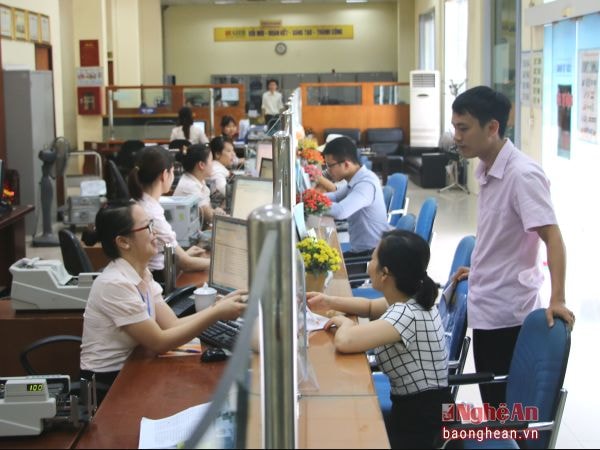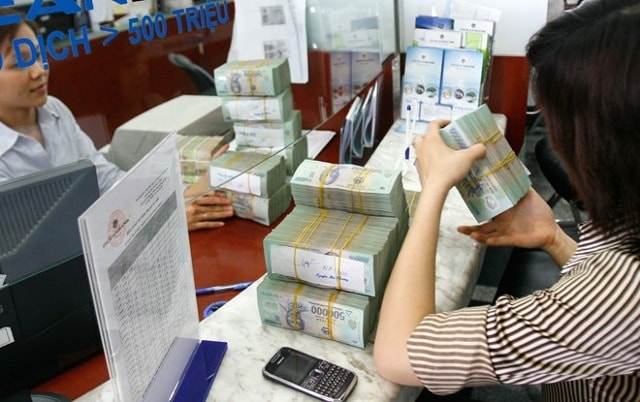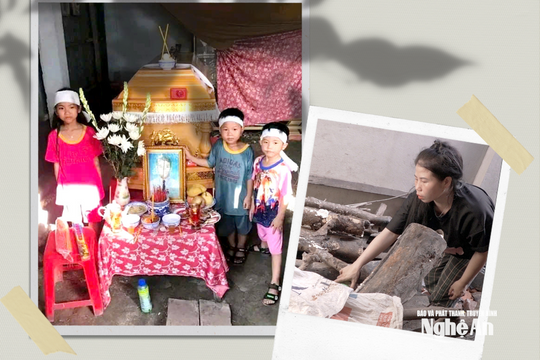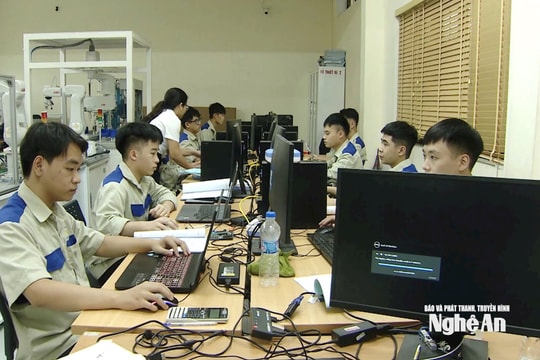Converting bad debt into equity, a bold proposal from banks
This is a bold move by the State Bank of Vietnam (SBV) as the agency is seeking opinions to complete the draft guidelines on capital contribution and share purchase of credit institutions (CIs).
Only bad debt exchange has risk of losing capital
The draft has a very notable point when designing a separate section regulating the conversion of debt into capital contribution and purchase of shares by credit institutions in enterprises. Accordingly, credit institutions are allowed to convert debt into capital contribution and purchase of shares, but must ensure the following conditions: only for debts in group 5 or debts that have been handled by risk provisions; the total amount of capital contribution and purchase of shares in any form must not exceed 40% of the charter capital and reserve fund of a commercial bank, and must not exceed 60% of the charter capital and reserve fund of a financial company.
 |
| Transaction at a bank branch in Vinh City. Illustrative photo |
| "Is the State Bank instructing commercial banks to continue to take people's mobilized money to convert into shares of failing businesses, meaning putting people's savings into another risky game? The State Bank must clarify this" - Dr. Bui Kien Thanh |
Former Governor of the State Bank of Vietnam Cao Si Kiem explained: Simply put, converting debt into equity means that instead of collecting the debt that has been lent to the enterprise, banks will use that receivable debt to buy the enterprise's shares at an equivalent price or according to an agreement. At that time, the creditor or debt buyer will become the owner of the enterprise, investing more capital to restructure all activities from human resource organization to production, business and development orientation... If bad debt is left, the enterprise cannot pay and will be left to survive, while banks still have to set aside regular provisions, the debt cannot be collected, the pressure is extremely high.
“Applying this measure will help banks get rid of bad debts soon, improve their financial reports, and increase capital sources as loans are converted into financial investments by banks. Enterprises will be relieved of the pressure to repay debts to banks, and have the conditions to restore production and business activities from capital sources provided by credit institutions or other investment sources,” Mr. Kiem acknowledged and further assessed that for the economy, handling bad debts by converting debts into contributed capital will minimize negative impacts such as bankruptcies of enterprises, job losses, etc.
In fact, before the draft was consulted, there were some cases of "breaking the rules", although the legal corridor had not yet been regulated. For example, the case of Vietnam Joint Stock Commercial Bank for Industry and Trade (VietinBank) participating as a strategic shareholder in the equitization of member ports of the Vietnam National Shipping Lines (Vinalines). VietinBank was allowed to convert the VND5,000 billion loan of Vinalines and its member units into equity capital at member ports when equitizing. This policy applies to Hai Phong Port Company and Da Nang Port Company... Similarly, Asia Commercial Joint Stock Bank (ACB) also had to buy back 12.6 million shares of Vietnam Shipping Joint Stock Company (code VOS), a member unit of Vinalines.
Previously, Saigon - Hanoi Commercial Joint Stock Bank also implemented the plan to convert debt into equity. In the period of 2011 - 2012, Binh An Seafood Joint Stock Company (Bianfishco) encountered difficulties due to unstable input materials, high financial costs, banks stopped providing credit, and poor corporate governance, causing production and business activities to stagnate. The company suffered losses, and the outstanding debt to banks and fish sellers amounted to thousands of billions of VND. With the consent of the Government, Saigon - Hanoi Commercial Joint Stock Bank (SHB) officially "married" Bianfishco and became the largest shareholder, owning 25 million shares, equivalent to 50% of Bianfishco's charter capital (Bianfishco has a charter capital of 500 billion VND) and participating in the comprehensive restructuring of Bianfishco's production and business activities. Currently, according to SHB leaders, Bianfishco has stabilized its operations and started making a profit, and the lives of its workers have been maintained.
Be careful
However, according to experts, converting debt into equity without caution will leave many risks and consequences. The State Bank's report shows that currently, bad debt in the whole system is 2.78% of total outstanding debt, below the safety threshold of 3%. However, at a recent meeting, Vice Chairman of the National Assembly Phung Quoc Hien said that the State Bank has not counted about 251,000 billion VND sold to VAMC. If this number is included, bad debt would have increased by 2-3 times.
 |
| Converting bad debt into equity is considered a bold move by the bank. |
More worryingly, according to financial expert - Dr. Le Xuan Nghia, currently about 70% of collateral assets of bank credit (estimated at more than 5 million billion VND) are in real estate. Only when the real estate market recovers can we hope to handle bad debt and grow the economy. Real estate is always a sensitive and risky field, if debt is converted into equity, banks will become real estate business owners. This is very dangerous for the economy.
Dr. Bui Kien Thanh, an economic expert, is concerned that the State Bank's regulations only allow the conversion of bad debts in group 5. According to the law, these are debts that are at risk of losing capital and cannot be recovered. According to Mr. Thanh, if the debt cannot be recovered and the bank converts it into shares, where will the money come from to restructure and pump more money into helping businesses revive? "Is the State Bank instructing commercial banks to continue to take money mobilized from the people to convert into shares of failing businesses, meaning putting people's savings into another risky game? The State Bank must clarify this," Dr. Thanh suggested.
An expert commented: “VietinBank builds ports, ACB does maritime transport, some banks do cement, steel, even fertilizer and catfish. Banks are financial intermediaries, providing capital and services, but owning shares, investing in such a mixed bag is also very risky.”
Manufacturing, trading, import-export enterprises have differences compared to banking business activities. If credit institutions do not have careful preparation and investment (especially in human resources), they will not only fail to "save" the enterprise but also make it difficult for themselves when bad debts do not decrease but increase. Each specialized field needs a well-trained chairman and director with management experience in that field. Meanwhile, bank owners do not have the necessary understanding in all fields.
Anh Vu/thanhnien.vn
| RELATED NEWS |
|---|








